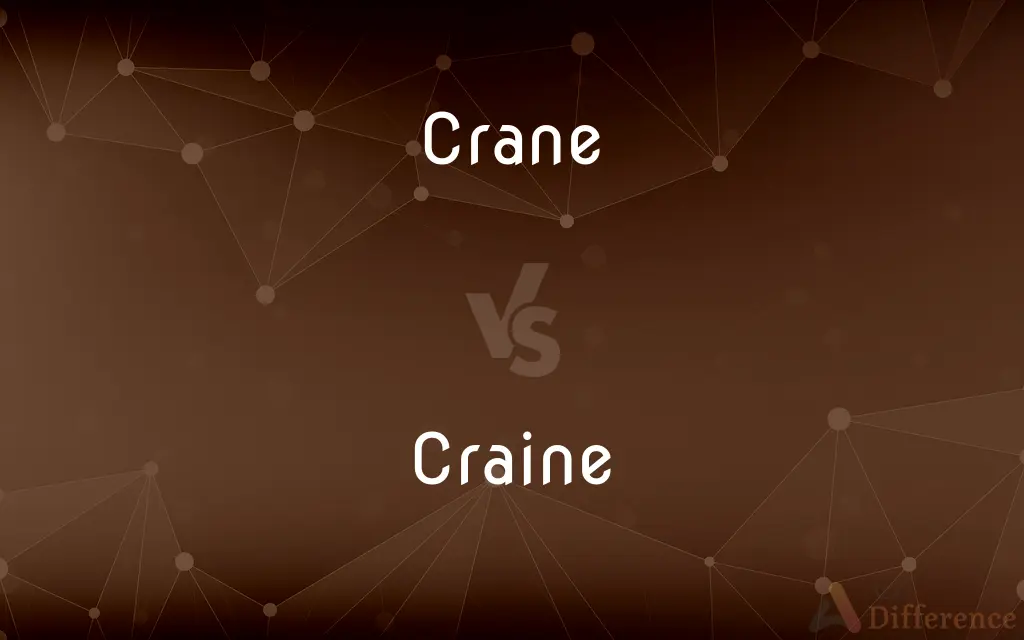Crane vs. Craine — Which is Correct Spelling?
By Tayyaba Rehman — Updated on March 19, 2024
"Crane" is the correct spelling, referring to a large bird or a machine for lifting. "Craine" is an incorrect variant.

Table of Contents
Which is correct: Crane or Craine
How to spell Crane?

Crane
Correct Spelling

Craine
Incorrect Spelling
ADVERTISEMENT
Key Differences
Think of the "crane" bird, which is spelled without an "i."
Remember the construction machine, "crane," lifting without the weight of an extra "i."
Note the word "rain" in "craine" but cranes lift above the rain.
Associate "crane" with "plain," both having one vowel before the "n."
"Crane" is plain and simple, just like its spelling.
ADVERTISEMENT
How Do You Spell Craine Correctly?
Incorrect: A craine is often seen at construction sites.
Correct: A crane is often seen at construction sites.
Incorrect: He used a craine to lift the heavy materials.
Correct: He used a crane to lift the heavy materials.
Crane Definitions
A machine for hoisting and moving heavy objects by means of cables attached to a movable boom.
Crane is a tall, long-legged, long-necked bird, often seen near water.
The crane stood still at the water's edge.
Any bird of the family Gruidae, large birds with long legs and a long neck which is extended during flight.
A machine for raising and lowering heavy weights, and, while holding them suspended, transporting them through a limited lateral distance. In one form it consists of a projecting arm or jib of timber or iron, a rotating post or base, and the necessary tackle, windlass, etc.; - so called from a fancied similarity between its arm and the neck of a crane See Illust. of Derrick.
Crane can describe the act of straining and stretching towards something.
He craned towards the window for a better view.
Crane also denotes a mechanism for dispensing liquid.
The old fountain had a crane to pour water.
Any of various large wading birds of the family Gruidae, having a long neck, long legs, and a long bill.
A similar bird, such as a heron.
Any of various devices with a swinging arm, as in a fireplace for suspending a pot.
To hoist or move with or as if with a crane.
To strain and stretch (the neck, for example) in order to see better.
To stretch one's neck toward something for a better view.
To be irresolute; hesitate.
Ardea herodias, the great blue heron.
A mechanical lifting machine or device, often used for lifting heavy loads for industrial or construction purposes.
An iron arm with horizontal motion, attached to the side or back of a fireplace for supporting kettles etc. over the fire.
A siphon, or bent pipe, for drawing liquors out of a cask.
(nautical) A forked post or projecting bracket to support spars, etc.; generally used in pairs.
(obsolete) The cranium.
(ambitransitive) To extend (one's neck).
(transitive) To raise or lower with, or as if with, a crane.
(intransitive) To pull up before a jump.
A wading bird of the genus Grus, and allied genera, of various species, having a long, straight bill, and long legs and neck.
Any arm which swings about a vertical axis at one end, used for supporting a suspended weight.
An iron arm with horizontal motion, attached to the side or back of a fireplace, for supporting kettles, etc., over a fire.
A forked post or projecting bracket to support spars, etc., - generally used in pairs. See Crotch, 2.
The American blue heron (Ardea herodias).
To cause to rise; to raise or lift, as by a crane; - with up.
What engines, what instruments are used in craning up a soul, sunk below the center, to the highest heavens.
An upstart craned up to the height he has.
To stretch, as a crane stretches its neck; as, to crane the neck disdainfully.
To reach forward with head and neck, in order to see better; as, a hunter cranes forward before taking a leap.
The passengers eagerly craning forward over the bulwarks.
Lifts and moves heavy objects; lifting tackle is suspended from a pivoted boom that rotates around a vertical axis
Large long-necked wading bird of marshes and plains in many parts of the world
Stretch (the neck) so as to see better;
The women craned their necks to see the President drive by
Crane refers to a large machine that moves heavy objects by suspending them from a beam.
The crane lifted the container onto the ship.
Crane means to stretch out one's body or neck, usually to see something.
She craned her neck to see the parade.
Crane Meaning in a Sentence
The crane lifted the steel beams to the top of the building.
The operator carefully maneuvered the crane to place the cargo on the ship.
Observing the elegant flight of a crane is a delight for nature lovers.
Crane operators must be vigilant to ensure the safety of everyone on the construction site.
The ancient art of origami includes a popular model known as the "paper crane."
Construction projects in the city are incomplete without the presence of a crane.
The child was fascinated by the crane, watching it hoist objects with ease.
The crane extended its neck to reach fish in the deeper part of the pond.
Folktales from various cultures feature the crane as a symbol of longevity and good fortune.
The company added a new crane to its fleet to increase its lifting capacity.
Before starting the day, the crane operator checks the machine for any safety concerns.
Crane Idioms & Phrases
Stretch like a crane
To stand very tall and straight, often to improve one's view.
He stretched like a crane to see over the fence.
Crane your neck
To stretch your neck out in order to see something better.
We had to crane our necks to see the performer through the crowd.
A crane in the sky
Something that is highly visible or obvious, especially in a construction context.
With all the new development, there's always a crane in the sky.
Paper crane
A symbol of peace and hope, often made in origami.
She folded a thousand paper cranes as a gesture of her wish for peace.
Fly like a crane
To move gracefully or effortlessly.
The dancer seemed to fly like a crane across the stage.
Common Curiosities
What is the pronunciation of Crane?
The pronunciation is /kreɪn/.
What is the singular form of Crane?
The singular form is "crane."
Why is it called Crane?
It's derived from the Old English "cran" for the bird, and Middle English "crane" for the lifting device, both due to its tall, extended shape.
What is the root word of Crane?
The root is the Old English "cran."
Which vowel is used before Crane?
It depends on context, but "a" as in "a crane" is common.
Is Crane a negative or positive word?
Neutral.
Is Crane an adverb?
No, it is not an adverb.
What is the verb form of Crane?
The verb form is "to crane," as in "craning one's neck."
Is Crane a collective noun?
No, it is not a collective noun.
Which preposition is used with Crane?
Commonly "with," "by," or "on" depending on the context.
Which conjunction is used with Crane?
Any conjunction can be used depending on the sentence structure.
Is the Crane term a metaphor?
It can be, especially when referring to "craning one's neck."
What is the plural form of Crane?
The plural form is "cranes."
Is Crane a countable noun?
Yes, e.g., "two cranes."
What part of speech is Crane?
Primarily a noun, but can also be a verb.
Which article is used with Crane?
Either "a" or "the," depending on context.
Is Crane a vowel or consonant?
"Crane" is a word composed of both vowels and consonants.
Is the word Crane a Gerund?
No, "craning" would be the gerund.
What is the opposite of Crane?
There's no direct opposite, but for the verb form, "retract" might be used in some contexts.
Which determiner is used with Crane?
Determiners like "this," "that," "some," "any" can be used.
Is Crane an abstract noun?
No, it represents tangible entities or actions.
Is the word Crane imperative?
No, unless used as a command like "Crane the load!"
How many syllables are in Crane?
One syllable.
What is a stressed syllable in Crane?
The entire word "crane" is stressed as it's one syllable.
What is another term for Crane?
For the bird: heron; for the machine: hoist.
Is Crane a noun or adjective?
"Crane" is primarily a noun, but can be used as a verb.
Is the word “Crane” a Direct object or an Indirect object?
It can be either, depending on the sentence structure.
How do we divide Crane into syllables?
Crane is one syllable and cannot be divided.
How is Crane used in a sentence?
The crane at the construction site lifted the heavy steel beams effortlessly.
Share Your Discovery

Previous Comparison
Trek vs. Treck
Next Comparison
Diminute vs. DiminutiveAuthor Spotlight
Written by
Tayyaba RehmanTayyaba Rehman is a distinguished writer, currently serving as a primary contributor to askdifference.com. As a researcher in semantics and etymology, Tayyaba's passion for the complexity of languages and their distinctions has found a perfect home on the platform. Tayyaba delves into the intricacies of language, distinguishing between commonly confused words and phrases, thereby providing clarity for readers worldwide.














































